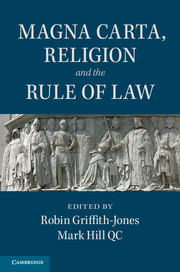Book contents
- Frontmatter
- Contents
- List of contributors
- Preface and acknowledgments
- I Introduction
- II The birth of Magna Carta and the spread of its principles
- III Comparative religious approaches to Magna Carta's rule of law
- 9 Quranic Magna Carta: on the origins of the rule of law in Islam
- 10 Justice in Islamic legislation
- 11 Shariʿa and the rule of law: preserving the realm
- 12 Democracy and the power of religion: some lessons from India
- 13 The still small voice of Magna Carta in Christian law today
- 14 Magna Carta, rule of law and religious diversity
- IV The contemporary inheritance of Magna Carta
- Appendix The Charters in translation
- Bibliography
- Index
10 - Justice in Islamic legislation
from III - Comparative religious approaches to Magna Carta's rule of law
Published online by Cambridge University Press: 05 May 2015
- Frontmatter
- Contents
- List of contributors
- Preface and acknowledgments
- I Introduction
- II The birth of Magna Carta and the spread of its principles
- III Comparative religious approaches to Magna Carta's rule of law
- 9 Quranic Magna Carta: on the origins of the rule of law in Islam
- 10 Justice in Islamic legislation
- 11 Shariʿa and the rule of law: preserving the realm
- 12 Democracy and the power of religion: some lessons from India
- 13 The still small voice of Magna Carta in Christian law today
- 14 Magna Carta, rule of law and religious diversity
- IV The contemporary inheritance of Magna Carta
- Appendix The Charters in translation
- Bibliography
- Index
Summary
King John sealed Magna Carta ‘for the honour of God and the exaltation of Holy Church and the reform of the realm’. Lord Sacks emphasises in Chapter 17 of this volume that the Charter was a covenantal document, reaffirming the covenant between God, the king and the people. This presents the whole charter in a new light. Nonetheless, once the Charter's preamble is over and the freedom of the English Church has in clause 1 been reaffirmed, the clauses take on the air of secular provisions recalibrating the power between the king and his barons. The Charter was the result of long and delicate negotiations that sought to rearrange the weights on a finely balanced pair of constitutional scales; and the archbishops and bishops advising the king may be seen as valuable participants, maintaining the equilibrium. They were not, of course, simply the midwives of a constitution in which they had no investment themselves. On the contrary, they had negotiated long and hard for the advantage of the Church. In the short term, all the efforts made for a peaceful settlement failed. But this is not to belittle the Charter's significance or the role of church leaders in its creation. The Charter became in the long term the symbolic foundation of all constitutions and jurisprudence in all common-law jurisdictions, and has since the seventeenth century been invoked in England and America as a bulwark against tyranny.
A Muslim observer is struck however by one other trend in the West, against which the Charter has seemingly been no bulwark at all: the secularisation of law and its administration. If we once acknowledge the Charter's political origins and emphasis, this may be no surprise. Sir Terence Etherton, Chancellor of the High Court, has recently surveyed the developments in England since Sir Matthew Hale famously declared in 1676: ‘to say religion is a cheat is to dissolve all those obligations whereby the civil societies are preserved, and Christianity is a parcel of the laws of England: therefore to reproach the Christian religion is to speak in subversion of the law’.
- Type
- Chapter
- Information
- Magna Carta, Religion and the Rule of Law , pp. 177 - 195Publisher: Cambridge University PressPrint publication year: 2015
- 1
- Cited by



